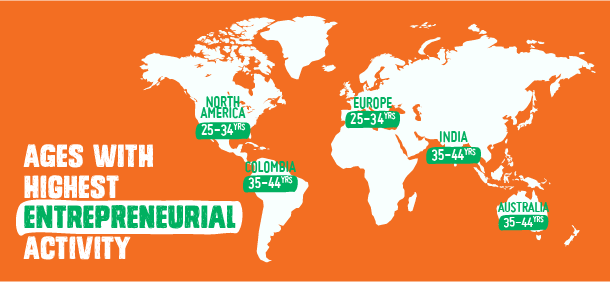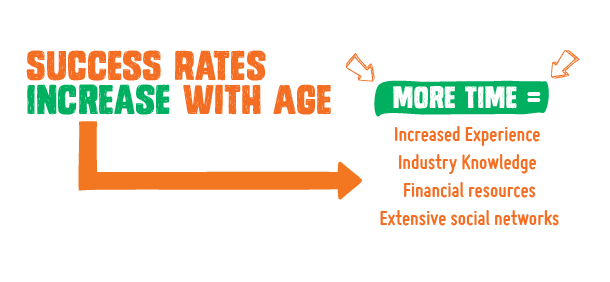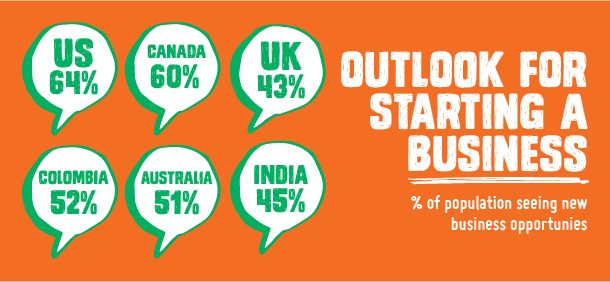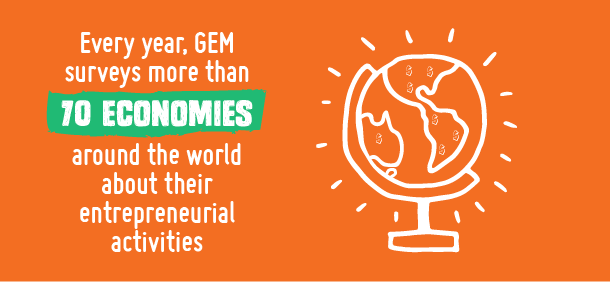Is there an ideal age to launch a new business? If you look at the examples of entrepreneurs like Steve Jobs, Mark Zuckerberg, and Elon Musk, then the answer is definitely “yes.” After all, they’re just a sampling of a group of highly influential and famous leaders who launched companies in their twenties and who now run billion-dollar businesses.
Rather than taking these success stories as representative of a larger truth, however, it’s important to ask whether there’s any data to back up assumptions. Fortunately, for several years now, many organizations have been doing just that. Today there are some interesting findings about how age factors into when people are starting businesses around the world, as well as their likelihood of entrepreneurial success.
Young people are launching more companies
One of the most well-known organizations studying entrepreneurship is the Global Entrepreneurship Monitor (GEM). Every year, GEM surveys more than 70 economies around the world about their entrepreneurial activities. Survey results are published in a report that help guide future research and policy decision making, as well as the design of government, educational, and private initiatives to enhance entrepreneurial success. Recently, its 2017/18 Global Report shed some light on how the age factors into who’s launching new businesses.
Across the globe more and more young people are starting companies. The highest prevalence of entrepreneurial activity is among those 25- to 34-years old and 35- to 44.

In North America, millennial’s have the highest rates of total entrepreneurial activity (TEA) — 23% of 25-to 34-year-olds. In comparison, European countries lag behind with only a 11% engagement. Notably, Latin America and Caribbean economies have the highest numbers of an even younger group excited about starting their own businesses — 16% of 18- to 24-year-olds in these countries are entrepreneurial, compared to 14% in North America.
When it comes to innovation, the average age skews older in the U.S.
While the 26 other innovation-driven economies in the GEM report demonstrated their highest TEA among 25- to 34-year-olds, the U.S. actually peaks in the next oldest age group, among the 35- to 44-year-olds. The report also found that entrepreneurs over the age of 35 have the best chance of success. In fact, between ages 35 and 45, entrepreneurs are better able to perceive opportunities than young people while also holding strong confidence in their abilities. This combination is the ideal recipe for success.
The Age and High Growth in Entrepreneurship report, published in April 2018, came to similar conclusions. After analyzing the age of 2.7 million U.S. business founders who launched companies between 2007 and 2014 from U.S. Census Bureau data sets, the authors learned that the average age of entrepreneurs is approximately 42. In industries like oil and gas or biotechnology the average age is between 47 and 51. Comparatively, software startup entrepreneurs the youngest of the bunch at 40-years-old.
The older generation has the highest success rates
While the success stories of famously young entrepreneurs may be inspiring a generation of new entrepreneurs, the exact reasons behind the surge in young people starting businesses can only be guessed at. In general, they’re generally believed to be more inclined toward innovative and disruptive thinking because they lack professional experience. Also, their lives usually don’t include family demands, which means they have more energy and the freedom to take risks. Oftentimes straight out of educational institutions, their fear of failure is relatively low. Despite these advantages, however, the older generation has a much better success rate when it comes to starting businesses.

In the U.S.-based report, the authors found that on average 45-year-old founders headed the top 1% of fastest-growing new ventures. For startups in the top 5%, the average founder age was 42. Moreover, they stated: “Overall, we see that younger founders appear strongly disadvantaged in their tendency to produce the highest-growth companies.” While there are many possible reasons for why this is the case, they speculated it comes down to several factors. For starters, older founders have more years of experience in their industries. They frequently also have greater financial resources to draw from, as well as more extensive social networks.
Change the narrative, improve the outlook
In the GEM report, more than half of Americans – 64% – see good opportunities around them for starting a business. This figure is higher than in the past several annual reports. And it distinguishes the United States most in comparison to the world’s other 26 innovation-driven economies where only 41% of people see these opportunities around them.

To improve the chances of more people taking the leap into starting a business, it’s important to associate entrepreneurship with a broad age range around the world. Associating entrepreneurship with youth means that investors are likely to bet on businesses started by founders that are too young. It also prevents middle-aged would-be entrepreneurs from quitting their 8-to-5 jobs and bringing their visions to life.
Updating ideas about when entrepreneurs are in their prime has the power to shift innovation around the world toward industries and areas where the older generation is likely to have the insight to make a real difference.
No matter your age, where you live, or where you’re looking to go, take the next step in your entrepreneurial journey and get your idea online today.





